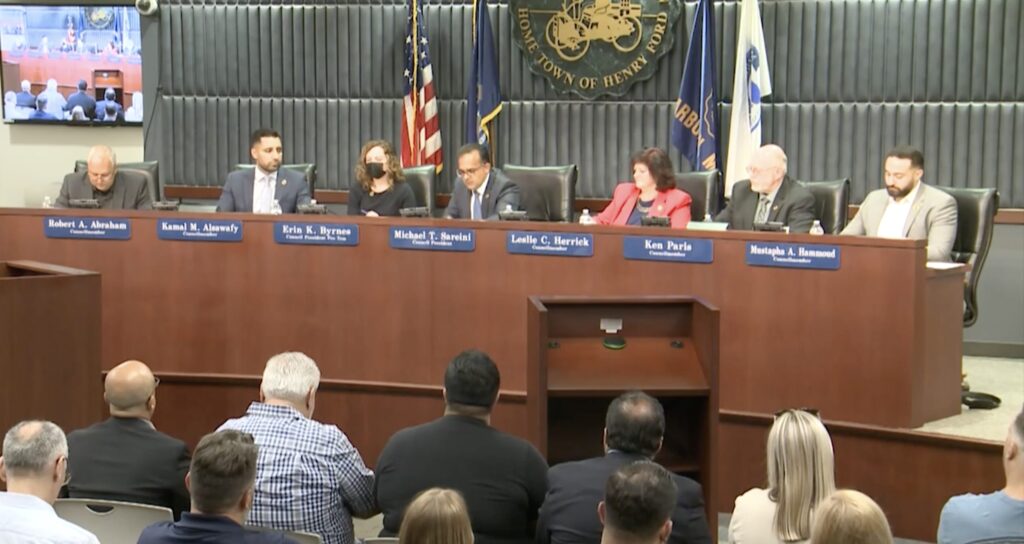DEARBORN — The Dearborn City Council voted during a June 7 meeting 6-1 in favor to pass Mayor Abdullah Hammoud’s first budget proposal as mayor.
The $128 million budget, which passed with only Councilman Ken Paris voting no, will take effect on July 1 and reduces the city’s $22 million structural deficit by nearly $20 million, a 90 percent reduction.
The shortfall came after voters declined to renew the city’s supplemental operating millage in November 2021.
A structural deficit occurs when ongoing spending exceeds ongoing revenue as opposed to one-off or short-term factors. Historically, the city has often used one-time funds or the city’s savings to bridge budget gaps.
“With so many challenges ahead, we approached this budget process with meticulous attention, but more importantly, compassion and care,” Hammoud said. “In the end, we offered a path forward that resulted in no layoffs, no service cuts and the long-term preservation of retiree benefits.”
The budget includes new investments, including providing funding for the first-ever comprehensive study of Dearborn’s water and sewage infrastructure in an attempt to help flood mitigation. The study will also provide a road map for the full greening of the city to help manage storm runoff and heavy rainfall.
The budget also provides investment in parks and recreation, including the free pool entry for children 13 and under, three new soccer fields, basketball and tennis courts, splash pads and other improvements.
In an attempt to address the vermin issue in the city, the budget includes an expanded vector control program to curb rat population growth.
With traffic being a high concern for residents, the budget allocates funding for traffic engineering measures to address speeding and hazardous driving, including speed humps, radar signs and the reengineering and redesign of streets to facilitate safe road conditions for drivers, cyclists and pedestrians.

A videograb of the Dearborn City Council meeting on Tuesday, June 7.
One of the hot topics in the budget was the proposed change to retiree healthcare, which the city stopped offering in 2012. The new budget includes $250 deductibles for post-Medicare retirees and $500 for pre-Medicare retirees under 65, with other retiree plans remaining unaffected.
The administration also pre-funded the deductibles for the first two years through new Healthcare Reimbursement Arrangements (HRAs) and created a hardship provision that exempts anyone who cannot afford the changes based on their income.
The city’s retiree healthcare, commonly referred to as OPEB, faced the risk of insolvency due to inadequate funding since 2007 as it was underfunded by approximately $60 million.
“These changes are about preserving this benefit for the long-haul, not just for current employees but also those who have yet to retire,” Hammoud said. “We need not look far to imagine where we were headed before. With the support of the City Council, we can now imagine a more certain future for this benefit and for the city more broadly.”
Hammoud also amended his own health plan and that of his senior staff to a $2,000 deductible plan for individuals.
The budget approval comes after seven weeks of budget presentations, hundreds of pages of detailed documents, at least 200 City Council requests for information, three public budget town halls held at the city’s high schools and live-streamed, a public town hall with retirees and countless meetings and phone calls with the budget stakeholders.
“This is not something anyone can do alone,” Hammoud said. “I’m grateful for the support, input and vigorous debate offered by our City Council to move this budget and our city forward.”
All documents and information regarding the Fiscal Year 2023 budget can be found on the city’s website.
Dearborn resident Amira Haidar spoke to The Arab American News about her impressions of the new budget.
“I personally think the Hammoud administration did very well in terms of harm reduction,” Haidar said. “I think they approached things in the most fair way possible.”
Haidar gave kudos to the administration for bringing together experts and reaching out to the community, to come up with the most effective solutions for the structural budget shortfall it inherited.
“If you look at the executive team that helped with the budget, they have a good head on their shoulders, they know what they’re talking about,” Haidar said. “Whichever avenue you take, there will be sacrifices in some shape or form. We see Hammoud putting in policies in other areas that are very beneficial to the community.”
Haidar said that clean and well-kept parks, and free recreation opportunities for residents, can go a long way in making the city an attractive place to live in, and contributes to its overall public health and safety.






Leave a Reply